Beginnings In January 2007, IE purchased SEK University and began adapting its program portfolio to ensure full compliance with the European Higher Education Area (Bologna Agreement) based on core values that included modernity, innovation, internationalization, entrepreneurial spirit, and a humanistic approach. In 2008, the name of the institution was changed from SEK to IE University and in the month of September it began its first academic year with official “IE University” Bachelor Programs in Architecture and in Communication, later adding degrees in Biology and Psychology. In September of 2009, IE University launched its first official Bachelor Degree in Business Administration, which was run in English and Spanish. Soon after the portfolio expanded to include Bachelor Degrees in Law, International Relations, and dual degrees. The University was initially housed exclusively in the old Santa Cruz la Real convent in Segovia, with a surface area of 18,000 m2, and then in 2012 it began to offer new intakes the opportunity to study the Bachelor in Business Administration and the Dual Degree in Business Administration and Law in the Castellon de la Plana building in IE’s Madrid campus. In the 2014-2015 academic year, IE University opened a new urban campus with a total surface area of 7,000 m2 in Maria de Molina 31bis, Madrid, with facilities to cater for up to 1,150 students. Students and recognition IE University has grown fast in recent years, as well as increasing the level of diversity and academic excellence of its student body. In 2009, after only one academic year, the University already boasted a student body comprised of students of 35 nationalities, with 70% international students. This percentage has remained high and in the 2014-2015 academic year the university will welcome students from 90 countries. More than 500 new students will begin their university studies at IE’s Segovia and Madrid campuses, and they will join some 1,000 students already studying there. In terms of international recognition, IE University is now an international reference on the global stage, as evidenced by the recognition afforded by rankings carried out by international press, such as the higher education rankings of the International Herald Tribune, now New York Times International, which placed IE University No. 45 worldwide in in 2012, and No. 34 in the world in 2013 based on recruiters’ opinions. IE University’s Bachelor in Business Administration was awarded the European Quality Improvement System (EQUIS) accreditation by European Foundation for Management Development (EFMD) in 2013, and was accredited by AACSB in 2012, thereby joining a select group of European universities recognized by both these leading international accrediting bodies. Innovation and entrepreneurialism Innovation and the entrepreneurial spirit form part of IE University’s DNA. From day one IE University adopted a humanistic, integrative, entrepreneurial, and flexible approach to the learning process. These values are evident, for example, in the IE module, comprised of across-the-board core subjects designed to strengthen, complement, and bring added value to the student’s education. The module enables students to learn about subjects like ethics, business, humanities and personal skills. It centers on equipping students with knowledge that goes beyond what they have learnt in their bachelor degree programs and which will serve to further their personal and professional development. Another innovative feature launched by IE University are its “laboratories” which enable students to tackle challenging projects. The students are placed in teams which undertake consulting or service projects for both external clients and for IE University departments, under the supervision of tutors and professionals. Hence all IE University students can work on their professional interests in these laboratories, gaining experience in very diverse areas. In 2014, for example, lab projects were undertaken in the fields of sport, marketing, psychology, communication, law and social projects. The labs play a key role in bringing students into contact with market realities. Students take full advantage of working in close collaboration with companies in sectors related to their studies, and they have the added incentive of being able to work on their own business ideas under the constant tuition of their professors. Innovative learning processes require innovative environments so that students can develop their full potential. IE University classrooms are equipped with latest generation technology, and IE University students have places at their disposal designed specifically for them. The Student Hub is located next to the central cloister. It is designed basically to provide a place where students can carry out multiple activities, be it reading, studying, group work, informal meetups or club meetings. In addition to events programmed by the University and its student office (Student Life), the Hub, which was opened in 2014, can be used by student clubs to stage their own events. Finally, students’ entrepreneurial ideas are now starting to enjoy success in society at large. One such example is Tyba, a young firm created by three students of IE University’s BBA program that was awarded a prize as the best start up in IE’s entrepreneurial community in 2013. The firm also won a public vote prize in IE Venture Day finals, and is one of 10 startups that won prizes at the Spain Startup & Investors Summit. Tyba is an online junior recruitment platform that permits students and recent graduates to showcase their full professional potential.
IE University

2014
IE University
